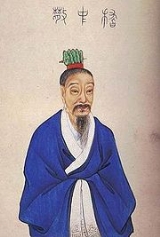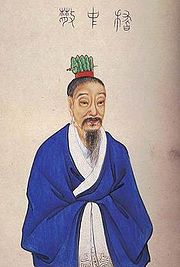
Xi Kang
Encyclopedia
 |
|
| Names Chinese name Personal names in Chinese culture follow a number of conventions different from those of personal names in Western cultures. Most noticeably, a Chinese name is written with the family name first and the given name next, therefore "John-Paul Smith" as a Chinese name would be "Smith John-Paul"... (details) |
|
|---|---|
| Also written as: | Ji Kang |
| Chinese Chinese language The Chinese language is a language or language family consisting of varieties which are mutually intelligible to varying degrees. Originally the indigenous languages spoken by the Han Chinese in China, it forms one of the branches of Sino-Tibetan family of languages... : |
嵇康 |
| Hanyu Pinyin: | Xī Kāng |
| Wade-Giles Wade-Giles Wade–Giles , sometimes abbreviated Wade, is a romanization system for the Mandarin Chinese language. It developed from a system produced by Thomas Wade during the mid-19th century , and was given completed form with Herbert Giles' Chinese–English dictionary of 1892.Wade–Giles was the most... : |
Hsi1 K'ang1 |
| Family name: | Xi |
| Traditional Chinese: | 嵇 |
| Given | names |
| Courtesy name : | Shuye (叔夜) |
| Pseudonym : | Zhongsan Daifu (中散大夫) |
Ji Kang(223–262) was a Chinese
Chinese people
The term Chinese people may refer to any of the following:*People with Han Chinese ethnicity ....
author, poet
Chinese poetry
Chinese poetry is poetry written, spoken, or chanted in the Chinese language, which includes various versions of Chinese language, including Classical Chinese, Standard Chinese, Mandarin Chinese, Cantonese, Yue Chinese, as well as many other historical and vernacular varieties of the Chinese language...
, Taoist
Taoism
Taoism refers to a philosophical or religious tradition in which the basic concept is to establish harmony with the Tao , which is the mechanism of everything that exists...
philosopher, musician
Musician
A musician is an artist who plays a musical instrument. It may or may not be the person's profession. Musicians can be classified by their roles in performing music and writing music.Also....* A person who makes music a profession....
and alchemist
Alchemy
Alchemy is an influential philosophical tradition whose early practitioners’ claims to profound powers were known from antiquity. The defining objectives of alchemy are varied; these include the creation of the fabled philosopher's stone possessing powers including the capability of turning base...
. He was one of the Seven Sages of the Bamboo Grove
Seven Sages of the Bamboo Grove
The Seven Sages of the Bamboo Grove were a group of Chinese Taoist Qingtan scholars, writers, and musicians who came together in the 3rd century CE. Although the individual members all existed, their interconnection is not entirely certain...
.
Biography
As a thinker, Ji Kang (Chinese: 嵇康) wrote on longevity, music theory, politics and ethics. Among his works were Yangsheng Lun (Essay on Nourishing Life), Shengwu Aile Lun (on the Absence of Sentiments in Music), Qin Fu (A Composition on the QinGuqin
The guqin is the modern name for a plucked seven-string Chinese musical instrument of the zither family...
), and Shisi Lun (Discourse on Individuality). As a musician, Ji Kang composed a number of solo pieces for Qin
Guqin
The guqin is the modern name for a plucked seven-string Chinese musical instrument of the zither family...
.
Ji Kang was highly critical of Confucianism
Confucianism
Confucianism is a Chinese ethical and philosophical system developed from the teachings of the Chinese philosopher Confucius . Confucianism originated as an "ethical-sociopolitical teaching" during the Spring and Autumn Period, but later developed metaphysical and cosmological elements in the Han...
and challenged many social conventions of his time. As such, he was considered scandalous and seditious. He married Cao Cao's granddaughter (or great-granddaughter according to some). Ji assumed a post under the Wei, but was not particularly interested in government work. When Sima Zhao
Sima Zhao
Sima Zhao was a military general, politician and regent of the state of Cao Wei during the Three Kingdoms period of Chinese history...
came to power, he intended to grant Ji a position as a civil official. However, Ji was uncooperative and behaved insolently to Zhong Hui, who was sent to inform him of Sima's offer. Later, one of Ji's friends was imprisoned after being framed. Ji defended him and testified in his case, and was also sent to jail as a result. Following Zhong Hui's advice, Sima Zhao sentenced Ji to death. Three thousand university students signed a petition to release him, but the appeal was denied. Before his execution, Ji Kang asked for his zither and played his swan song, the famous guqin masterpiece Guangling san, which music is presumed to be forever lost.
See also
- 《琴賦》
- List of Chinese authors
- Ji Kang in contemporary art
External links
- Xi Kang Xi Kang and Qin music.

